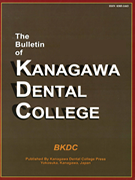- HOME
- > 一般の方
- > バックナンバー:The Bulletin of Kanagawa Dental College
- > 38巻1号
- > アブストラクト
アブストラクト(38巻1号:The Bulletin of Kanagawa Dental College)

English
| Title : | Natural Decrease of Surface Capability of Titanium over Time and Its Rejuvenation |
|---|---|
| Subtitle : | BKDC CLINICAL AND RESEARCH TOPICS |
| Authors : | Norio Hori |
| Authors(kana) : | |
| Organization : | Division of Fixed Prosthodontics, Department of Oral and Maxillofacial Rehabilitation, Kanagawa Dental College |
| Journal : | The Bulletin of Kanagawa Dental College |
| Volume : | 38 |
| Number : | 1 |
| Page : | 49-51 |
| Year/Month : | 2010 / 3 |
| Article : | Report |
| Publisher : | Kanagawa Odontological Society |
| Abstract : | [Abstract] We tested a hypothesis that the surface capability of titanium, which is critical to the process of osseointegration, changes over time before its use. Samples of various titanium surfaces (machined, acid-etched, sandblasted) were prepared and stored under dark ambient conditions for three days, one week, and four weeks. For all the surfaces, the protein adsorption and cell attachment decreased with the increase in the storage time, and the rates of decrease were dependent on titanium topography. After four weeks, the amounts of protein adsorption had decreased significantly compared with that of a new (fresh) surface. The dependent degradation in biological responses (protein adsorption and cell attachment) of titanium observed at this time correlated with hydrophilicity and hydrocarbon contamination. It had not previously been possible to prevent the occurrence of these phenomena (titanium aging) within existing science and technology. However, the authors discovered a method of recovery using light irradiation. This treatment of aged surfaces with light recovered hydrophilicity and increased cell attachment capacity to a higher condition than that of a new (fresh) surface. These results suggested that a time-dependent biological degradation of titanium exists, and that restoration can be enabled by treatment with light, thereby surmounting the innate bioactivity of a new (fresh) surface. |
| Practice : | Dentistry |
| Keywords : |
